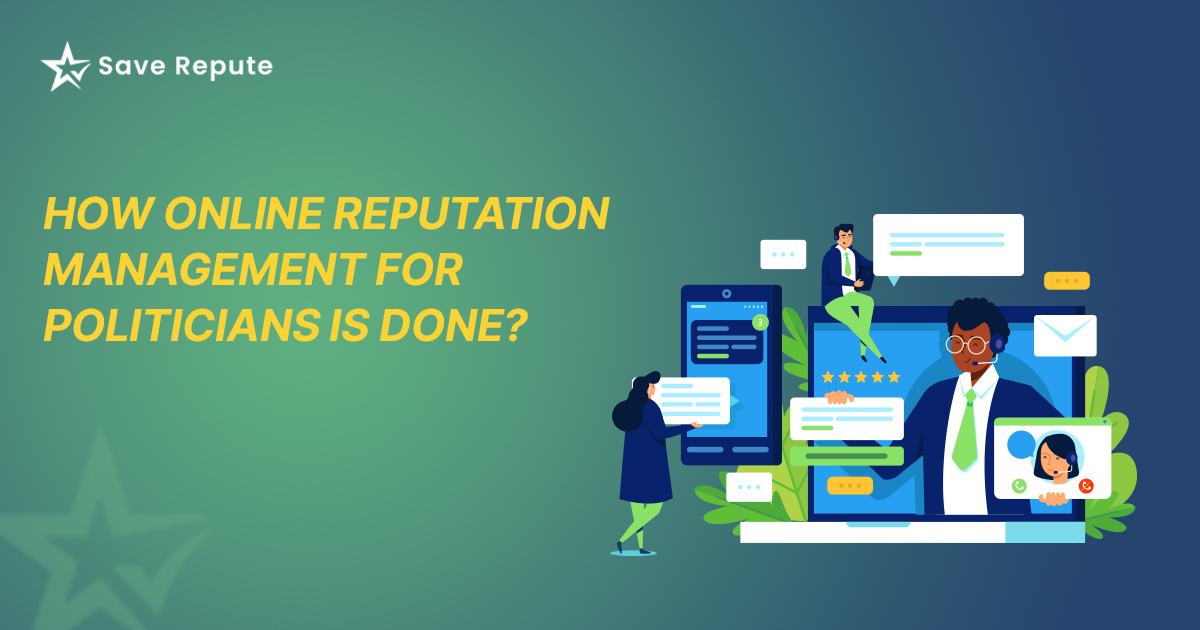Online Reputation Management for Politicians is no longer a mere option but a critical necessity in the ever-evolving digital age. For political leaders and candidates, the online world acts as a powerful amplifier of public perception, where every tweet, post, and comment can significantly sway public opinion.
Navigating this landscape requires not only vigilance but also a strategic approach to ensure that their digital footprint aligns with their political persona and objectives. In this landscape, a well-managed online reputation can be a career-defining asset, fostering trust and credibility among constituents while effectively countering misinformation and negative publicity.
Why Online Reputation Management is Important for Politicians?
Influence on Voter Perceptions:
The online presence of a politician significantly shapes how voters perceive their character and policies. Effective online reputation management can build and maintain a positive image, crucial for gaining and retaining voter trust.
Impact on Election Outcomes:
In the digital era, online narratives can greatly influence election campaigns. Proactive reputation management can sway public opinion, potentially impacting election results.
Crisis Management:
In times of controversy or crisis, how a politician’s reputation is managed online can be the difference between a career setback and a recoverable situation.
Counteracting Misinformation:
With the prevalence of fake news, it’s essential for politicians to have a strategy for Online reputation repair to quickly and effectively address false information that could harm their public image.
Building Credibility:
Consistent and positive online engagement helps in establishing a politician as a credible and reliable figure in their field.
Global Reach:
The internet’s global nature means a politician’s online reputation transcends borders, influencing international opinions and relations.
Long-Term Reputation Protection:
Online reputation is not just about immediate concerns; it’s a long-term investment in a politician’s future. Reputation protection strategies ensure a lasting, positive public image that can benefit their entire political career.
How Does Online Reputation Management Work for Political Candidates?
Online Reputation Management (ORM) for political candidates involves a strategic approach to shaping the public’s perception of them on the Internet. This process starts with Online reputation monitoring, where a team continuously scans the web for mentions of the candidate, including news articles, social media posts, and blog entries. This comprehensive monitoring allows for a quick response to any negative content and an opportunity to amplify positive messages. Additionally, ORM involves optimizing the candidate’s own digital platforms, ensuring that their official website and social media profiles rank high in search results, thereby controlling the narrative about them.
The second phase of ORM for political candidates focuses on response and engagement. When negative information surfaces, Personal online reputation management strategies come into play, involving crafting well-thought-out responses that address concerns while maintaining the candidate’s public image.
On the flip side, positive mentions are leveraged to strengthen their reputation, engaging with supporters and neutral audiences alike. ORM for political figures also includes creating and distributing positive content that aligns with their political agenda and values, ensuring that their online presence accurately reflects their real-world persona and objectives.
Responding to Negative Information
- Quick and Fact-Based Response: When facing false accusations, it’s crucial for politicians to respond swiftly. Delay can often be perceived as an admission of guilt. Their response should be fact-based, providing clear and concise evidence to refute the accusations, thereby demonstrating transparency and credibility.
- Utilize Official Channels for Communication: Politicians should use their official communication channels, such as press releases or their official social media accounts, to address false claims. This ensures the message reaches a wide audience and is seen as an official stance, lending it more credibility.
- Engage Legal Counsel When Necessary: In cases where false accusations are particularly damaging or defamatory, involving legal counsel is advisable. They can provide guidance on the best course of action, including potential legal remedies.
- Maintain Consistency in Messaging: Consistency is key in combating misinformation. Politicians should ensure that their responses across different platforms are uniform, reinforcing their stance and preventing any misinterpretation of their message.
Essentials For Maintaining An Online Reputation For Politicians
Building a Professional Digital Team:
Assembling a team of digital experts is crucial. This team should be skilled in social media management, content creation, SEO, and crisis communication.
They are responsible for crafting and maintaining the politician’s digital persona, ensuring that every post and response aligns with their overall image and political goals.
Importance of Consistent Messaging Across All Platforms:
Politicians must ensure their message remains consistent across all digital platforms. Whether it’s social media, their website, or press releases, the core message, values, and responses should align. This consistency helps in building a trustworthy and reliable image among the electorate.
Active Social Media Engagement:
Engaging with followers on social media is essential. Politicians should regularly post updates, respond to comments, and participate in online discussions. This engagement not only humanizes them but also allows them to shape their narrative directly.
Regular Monitoring and Analysis:
Continuous monitoring of online presence is vital. This involves tracking mentions, understanding public sentiment, and staying ahead of any potential issues.
Regular analysis helps in adjusting strategies to better manage the politician’s online reputation.
Strategic Content Creation:
Creating and disseminating high-quality, relevant content is key. This could include policy explanations, achievements, community work, and personal stories that resonate with the audience.
Content should be tailored to different platforms to maximize its impact and reach.
Top 9 Online Reputation Management Strategies For Political Leaders
- Leveraging Social Media for Positive Engagement: Politicians should actively use social media to engage positively with their audience. This involves sharing updates, responding to comments, and participating in relevant online discussions, fostering a more relatable and approachable image.
- SEO Tactics to Improve Positive Online Visibility: Implementing Search Engine Optimization (SEO) strategies is crucial for ensuring that positive content about the politician appears at the top of search engine results. This includes optimizing their official website and publishing regular, high-quality content.
- Proactive Reputation Monitoring: Constantly monitoring their online reputation enables politicians to stay ahead of any negative sentiments or misinformation. Tools for “Online reputation monitoring” can alert them to potential issues before they escalate.
- Creating a Strong Personal Brand: Developing a personal brand that resonates with their target audience is key. This involves consistently conveying their values, vision, and policies across all digital platforms.
- Engaging with Influencers and Thought Leaders: Collaborating with influencers and thought leaders can help extend their reach and lend credibility to their campaigns. This strategy can be particularly effective when addressing younger demographics.
- Handling Negative Feedback Constructively: Politicians should address negative feedback in a constructive manner. This involves acknowledging valid criticism and responding thoughtfully, turning potential negatives into opportunities for demonstrating responsiveness and accountability.
- Utilizing Multimedia Content: Diversifying content types – such as videos, infographics, and podcasts – can increase engagement and appeal to a broader audience. This approach can help in better conveying complex political messages in an accessible manner.
- Regular Updates and Transparency: Keeping the public regularly informed about activities, decisions, and policies fosters transparency. This strategy helps in building trust and countering any false narratives.
- Personal Online Reputation Management: Politicians should also focus on managing their personal online reputation, ensuring that their private personas align with their public image. This involves being mindful of their interactions and the content they share on personal social media profiles.
Why Choose Saverepute For Online Reputation Managment?
Choosing Saverepute for online reputation management offers political leaders a distinct advantage due to our unique services and approach. Unlike generic reputation management firms, Saverepute specializes in the nuanced field of political online presence. Our team combines expertise in political communication, digital strategy, and advanced analytics to craft bespoke solutions for each leader.
We excel in proactive monitoring, rapid response to emerging issues, and strategic content dissemination, ensuring that a politician’s online image aligns seamlessly with their real-world persona and campaign objectives.
Our approach is not just reactive; we build and maintain a positive digital presence that resonates with constituents and strengthens a politician’s influence in the digital arena.
Conclusion
The importance of online reputation management for politicians cannot be overstated. In a digital age where public perception is increasingly shaped online, maintaining a positive and proactive digital presence is essential.
Effective Personal online reputation management and Online reputation repair are not just about countering negatives; they’re about building a trustworthy and engaging political persona. Politicians should view online reputation management as a vital component of their overall strategy, taking action to ensure their digital footprint aligns with their values and political ambitions.


